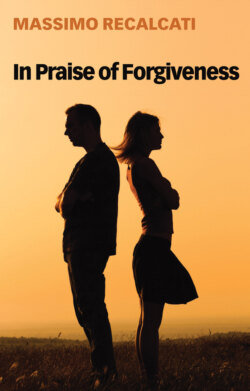Читать книгу In Praise of Forgiveness - Massimo Recalcati - Страница 14
Love as Resistance to the Libertine Worship of the New
ОглавлениеThe demand accompanying every real love, notably that it be everlasting, resists the nihilistic tendencies of our time. It upholds, in an old-fashioned way, the assertion that the loving bond is not destined to dissolve over time, but that in that bond time appears as a sudden and powerful figure of the eternal.15 It does not follow the current trend, it does not deride the promises made by lovers, and it does not want to reiterate the relativity of every loving bond in a politically correct way. Here we have love as an erotic force, a manifestation of Eros, the force of the bond according to Freud, a force that resists time and that introduces time to the single experience of the absolute conceded to human beings: that of the loving bond as a bond with a unique Other, an Other that is irreplaceable, impossible to reproduce. Love that lasts reveals the entirely illusory nature of the Super-Ego’s injunction of the New, demonstrating to us how the most authentic experience of the New can only take place within the Same. The psychoanalyst sees this every day: the New as an (illusory) cure for the bored repetition of the Same always leads life back to the same lack of satisfaction. This is what patients caught in the spiral of continually changing partners complain about. Each time they describe the new love as ideal, full of promise, different and unique, each time in just a short, if not incredibly short time, they find it to be disappointing, inadequate and sadly identical to all the others.
Love that lasts resists the corrosive urge of enjoyment as an end in itself and refuses the illusion that happiness lies in the New, in what we do not possess. Thus, love is the New which, rather than attacking the bond, transforms itself into a bond. It does not experience joy just for a moment, but obstinately demands its infinite repetition, because it is only through repetition that it can show the true face, the only credible face of the New. According to Heidegger, the force of the loving bond therefore becomes similar to that of a work of art: it allows a refounding of the openness to the world.16 This is why lovers live in a world that is no longer the same one as before, that of the One on their own, because this world is lived in a brand new way as a Two. It is, therefore, a new opening onto the world, a world viewed not from the point of view of one alone, but of the Two.17 It is only this new perspective that allows us to experience the New in the Same, as happens every time the spring wind blows into Milan exposing the blue peaks of the Alps every year at the end of every winter. It is the Same wind each time every year, and each time every year it is new. It is the same surprise that accompanies the Two in seeing mushrooms spring up on forest floors, or observing the portulaca flowers on the terrace of the house by the sea resist the force of the wind.18 Each time the Same and each time entirely New. Is this not the Same enchantment that accompanies a life spent together in lasting love, in love that resists the empty siren song of the New, even in its most modest ordinariness? Is it not her that I always love as Other in being herself? Is the same day not a New one in light of love? Is it not what I have that, thanks to love, becomes New each time? Is it not love that reveals the repetition of everyday things to be pure poetry, like the strength of the image that does not pass, that is suspended and sits outside of time? The Morandiesque attention to things in the world that is found in the most recent poetry by Francesco Scarabicchi is one of the highest and most intense glorifications of the shared time of things bending towards the eternal.19 This is why when Lacan dedicated one of his most intense and original Seminars to the subject of love he decided to call it Encore, again, again, encore. 20 ‘Again’ is, in essence, the basic form taken by the demand for love. Again, again, the Same again, again like today, again like now, once more, again. To want the Same again, the Same that is never enough, that you want to drink because it quenches thirst and, at the same time, feeds a new thirst that is never quenched, but that grows precisely as you try to quench it without every truly managing. It is only in the gift of life that there is a growth of the self, a strengthening and expansion of life that is able to live the absolute exposure to the desire of the Other. This is one of the decisive theses put forward by Saint Augustine: love is not cupiditas [lust, greed], it is not the greedy consumption of the Other, but the gift of oneself that causes those who give it to grow.21 Is this not deep down the strange substance from which love is made? A substance that the more it is given, the more it concedes, the more it is consumed, the more it enriches, grows and expands. This is why the young Hegel wanted to carve all of the mystery and power of love into the words Shakespeare’s Juliet says to her Romeo: ‘The more I give to thee, the more I have.’22
